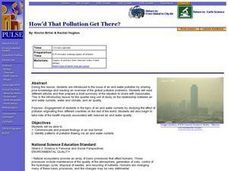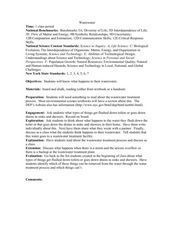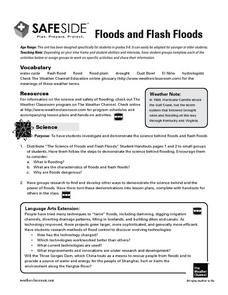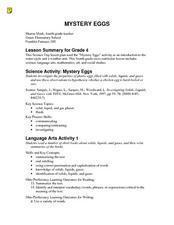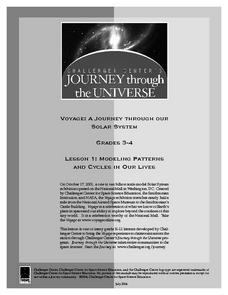Curated OER
Wet 'n Wild Watershed
Students engage in a discussion on watershed management. In this ecology lesson, students consider the role of forests in water quality. Students incorporate lecture material into a class room discussion and questions on water shed...
Curated OER
How Much Do I Know About Water?
Sixth graders explore how water behaves on a penny. In this states of matter lesson, 6th graders observe water as they add drops to a penny. This lesson helps students apply the adhesive properties of water to the water cycle.
Curated OER
Rainy Day Hike
Students develop awareness about the water cycles. They identify the watershed in which their school is located. They explain the role the schoolyard plays in the watershed.
Curated OER
Mini-Ecosystems
Pupils use plastic bottles to create terrariums and plant Venus Flytraps. They observe the plants and the terrariums for illustrations of the water cycle and species' adaptations to a specific environment.
Curated OER
Physical and Chemical Changes
Sixth graders complete several experiments about chemical and physical changes. In this physical and chemical science lesson, 6th graders complete 6 experiments about chemical and physical changes. Students examine the processes of...
Curated OER
BLue Themes in Literature
Students explore "blue themes" in literatures. Students read stories and write sentences using homophones. They locate the state of Main on a Map. Students estimate the number of blueberries in a jar. They create a flip book describing a...
Curated OER
Weather
Second graders, while examining the weather, describe the characteristics of the Sun, Stars and Earth's Moon (e.g relative size, shape, color, production of light, heat). Thus, the give examples of how the sun affects Earth's processes...
Curated OER
TRANSPIRATION IN PLANTS
Young scholars define the hydrologic cycle, define transpiration, name the three parts of the hydrologic cycle, and record the amount of moisture given off by several green plants.
Curated OER
Environment: How'd That Pollution Get There?
Young scholars examine how global wind and water patterns aid in the spread of worldwide pollution. In groups, they read articles about the domino effect of pollution and create posters displaying its journey. On blank world maps,...
Curated OER
Moving Water
In this water activity, students will review the groundwater system, hydrologic cycle, and water table. This activity has 10 matching, 6 true or false, 3 short answer, and 2 multiple choice questions.
Curated OER
Wastewater
High schoolers discuss what happens to their wastewater. They read about the wastewater treatment process. Students are asked what types of things get flushed down toilets or goes down drains in sinks and showers. They are taught what...
Curated OER
Transpiration
Learners examine the part that transpiration plays in the hydrologic cycle. They observe how plants play a role in maintaining a stable environment.
Curated OER
A Comparison of Cloud Coverage Over Africa
Students use a NASA satellite data to contrast amounts of cloud coverage over different climate regions in Africa. They explore how Earth's major air circulations affect global weather patterns, and relate to local weather patterns.
Curated OER
Floods and Flash Floods
Junior geologists, hydrologists, or meteorologists simulate what happens during the flooding of a river and demonstrate factors that contribute to flash flooding. This outstanding resource provides a vocabulary list, online resources,...
Curated OER
Mystery Eggs
Students investigate the properties of plastic eggs filled with solids, liquids, and gases and use these observations to hypothesize whether a chicken egg is hard-boiled or raw.
Curated OER
Nurturing Green Thumbs at School
Incorporating a school garden into the curriculum cultivates many benefits.
Curated OER
Water Supply and Water Uses
A large variety of topics are given in this PowerPoint about water. Some come from a scientific point of view, some regarding recreation, some for domestic use, and others from hydroelectricity. A teacher could choose to use this...
Virginia Department of Education
The Cycles of Nature
Encourage peer collaboration and assist with the creation of visual aids to identify carbon, water, and nitrogen cycles as your class learns more about nature. They discuss relative information, create a visual aid depicting the chosen...
Curated OER
Water in Earth's Hydrosphere
Environmentalists test stream water for temperature, pH, and turbidity. Each group shares their information and then the class makes an overall evaluation of the water quality. A slide show sets the backdrop for the teaching portion and...
Curated OER
The Carbon Cycle
Here is an interesting science lesson. Pupils discover that carbon, just like water, is absolutely necessary for all living things to survive. They study how it cycles through nature, become familiar with the periodic table, and look at...
Curated OER
Ride the Rock Cycle
Students identify the steps in the rock cycle. They complete a K-W-L chart before the lesson begins. They answer questions about the stages to complete the lesson.
Maryland Department of Natural Resources
Eyes on Dissolved Oxygen
Learn about the factors that affect the way oxygen dissolves in salt water with a chemistry lab. After studying the molecular structure of water, young scientists figure out how aeration, temperature, and organic waste affect dissolved...
Curated OER
Modeling Patterns and Cycles in Our Lives
Students explore how building a model can help them better understand the natural world. They identify common cycles or patterns in nature as well as examples of models in the classroom. After discussion, they choose a pattern or cycle...
American Museum of Natural History
Be a Water Saver
Everyone must do their part to make a difference. The lesson link provides an 11-item questionnaire to reflect on conservation practices. Simple and straightforward, the lesson is perfect as a remote learning resource or as a tool for an...
Other popular searches
- Water Cycle Diagram
- The Water Cycle
- Water Cycle Experiment
- Water Cycle Activities
- Water Cycle Stages
- Water Cycle Crossword
- Water Cycle Lesson Plans
- Water Cycle Reader's Theater
- Water Cycle and Evaporation
- Water Cycle Diagram Label
- Water Cycle Simulation
- Build Your Own Water Cycle










